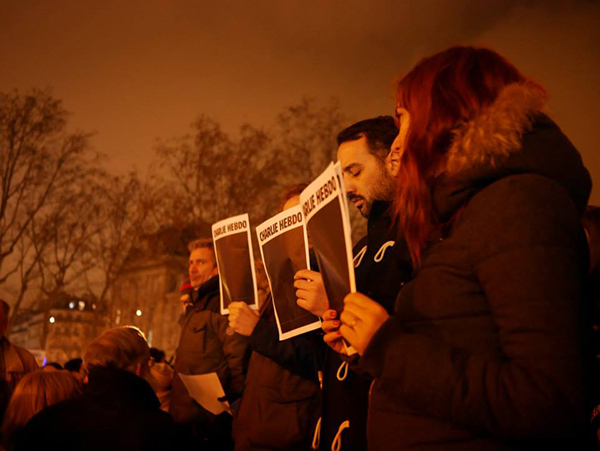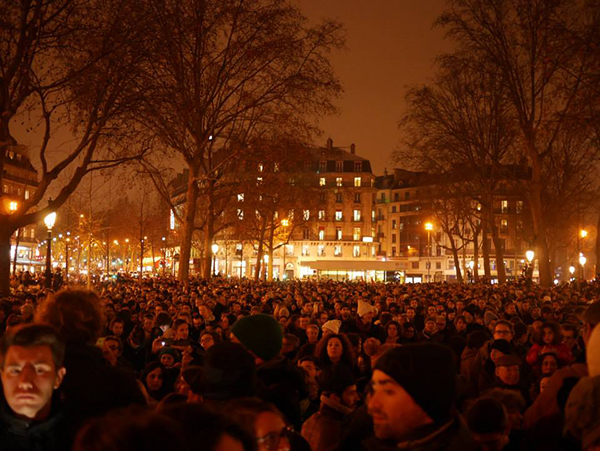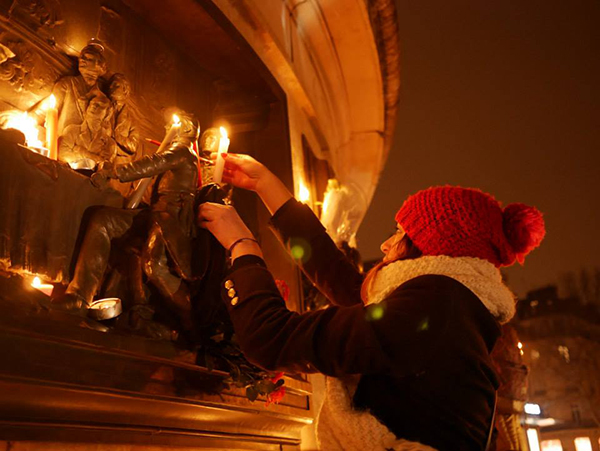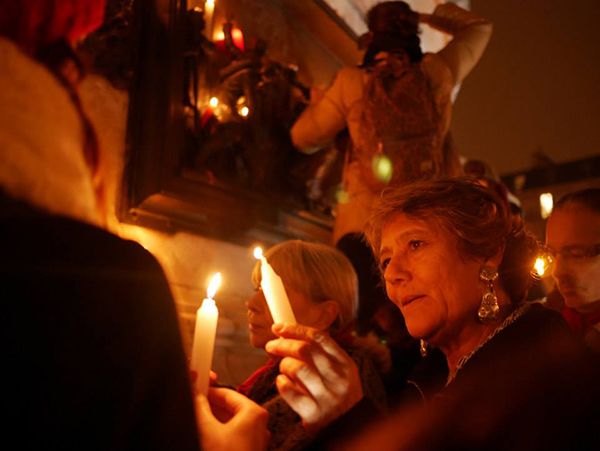January 19, 2015
Journalism students join Parisians in support of freedom of expression
Ten journalism students are spending the summer in Paris with Julie Posetti, a journalist and academic who is currently a Research Fellow with the World Association of News Publishers and the World Editors Forum.

Photo: Angelique Lu
On 7 January, French satirical weekly magazine Charlie Hebdo was attacked by two gunmen. The assault was an attack of press freedom, the exact thing UOW’s students are researching while interning alongside Ms Posetti.
Without delay, journalists in Australia began reaching out to Ms Posetti for her analysis of the situation - the attack and the public’s reaction.
Media coverage featuring Ms Posetti:
● Australian in Paris describes the city's response to the attack (AM)
● UOW academic in Paris describes the city's response to terror attack (ABC)
● An attack on expression (Illawarra Mercury)

Crowds rallied in Paris to show solidarity with those killed by the gunmen. Photo: Angelique Lu
Though Ms Posetti and UOW’s students were safe, the incident certainly affected them. Journalism student Angelique, writing for UOWTV, recounted her experience of that day.
Below is an edited version of Angelique’s post; read the original post on UOWTV Multimedia.
Before the awful events in Paris last week, writing about press freedom issues as an intern had made me realise just how lucky I am. According to figures collected by UNESCO, in 2013, 91 journalists were killed worldwide, and by November last year a further 70 journalists had been killed. Those who commit these crimes often go unpunished, and continue to act with impunity – so much so that UNESCO created the International Day to End Impunity for Crimes against Journalists’ (IDEI) to raise awareness on the assault on press freedoms. When news began to break in Paris about the shootings, it hit too close to home – personally and professionally.

I first heard the news on Twitter. I was scrolling through my feed to research a story I was writing, when, at about 11am Paris time, I saw a tweet saying “#breaking: 1 dead in shooting in Central Paris.
#BREAKING : Shooting in #Paris at @Charlie_Hebdo_ HQ , 1 policeman injured (witnesses) http://t.co/OYSXRQ9xuv
— FRANCE 24 English (@France24_en) January 7, 2015 The mood in the office was sombre as we monitored Twitter and various news feeds. As more deaths were confirmed and as news reports detailed the nature of Charlie Hebdo’s work, it became clear it was an attack on press freedom, the very topic I had come all the way from Wollongong to Paris to write about, and in the city that had taken me in to help teach me the journalism craft.
Six o’clock Wednesday night, the entire office left together to go to Place de la Republique, a major square in the heart of Paris. ... I immediately noticed how sombre the crowd was – quiet. People would occasionally begin chanting “Charlie, Charlie, Charlie” or “Liberté! Expression” (Freedom of Expression) and drown themselves out in a sea of clapping.
Signs of unity and solidarity at Place de la Republique in Paris. #JeSuisCharlie #CharlieHebdo pic.twitter.com/IovUar3VWk
— Angelique Lu (@Angelique_Lu) January 7, 2015 It was a sad but defiant crowd. I lost my co-workers in the masses, and I decided to head to the foot of the monument at the centre of the square. People were placing pencils and candles at the monument. A woman next to me struggled to climb the statue, and another person held her so she wouldn’t fall. As I was standing at the foot of the statue, someone handed me a box of candles. Taking a candle out of the box, I realised I didn’t have any matches. The man to my right noticed my predicament and shared a flame with me. People around me were helping each other light candles. It was a show of solidarity. I never felt more at home in Paris than I did at that first vigil.
Lighting candles at Place de la Republique Paris #jesuischarlie #CharlieHebdo https://t.co/P4BODk5VUu
— Angelique Lu (@Angelique_Lu) January 7, 2015 Knowing the gunmen targeted journalists in Paris in an attempt to suppress press freedom has affected me more deeply than most news stories. When the Charlie Hebdo shootings news broke, my instinct was to re-assess the pieces I’ve written. Have I written anything that could potentially drive someone to commit a crime like this? I am ashamed of the reaction. I read an interview with Margaret Atwood in the Paris Review the other day, and one quote seems more relevant today:
"All children ‘write.’ (And paint, and sing.) I suppose the real question is why do so many people give it up."

People placed pencils and candles at Place de la République on 7 January, 2015. Photo: Angelique Lu
I hope the events of the past week will mobilise people. I hope that it draws attention to the plight of journalists not just in France, but to people all over the world who are persecuted, jailed or killed for daring to use their Article 19 – UN Declaration of Human Rights freedom of expression. I hope journalists continue to write, photograph, draw, record and publish stories on things that matter. And I hope I will be brave enough to follow in their footsteps.